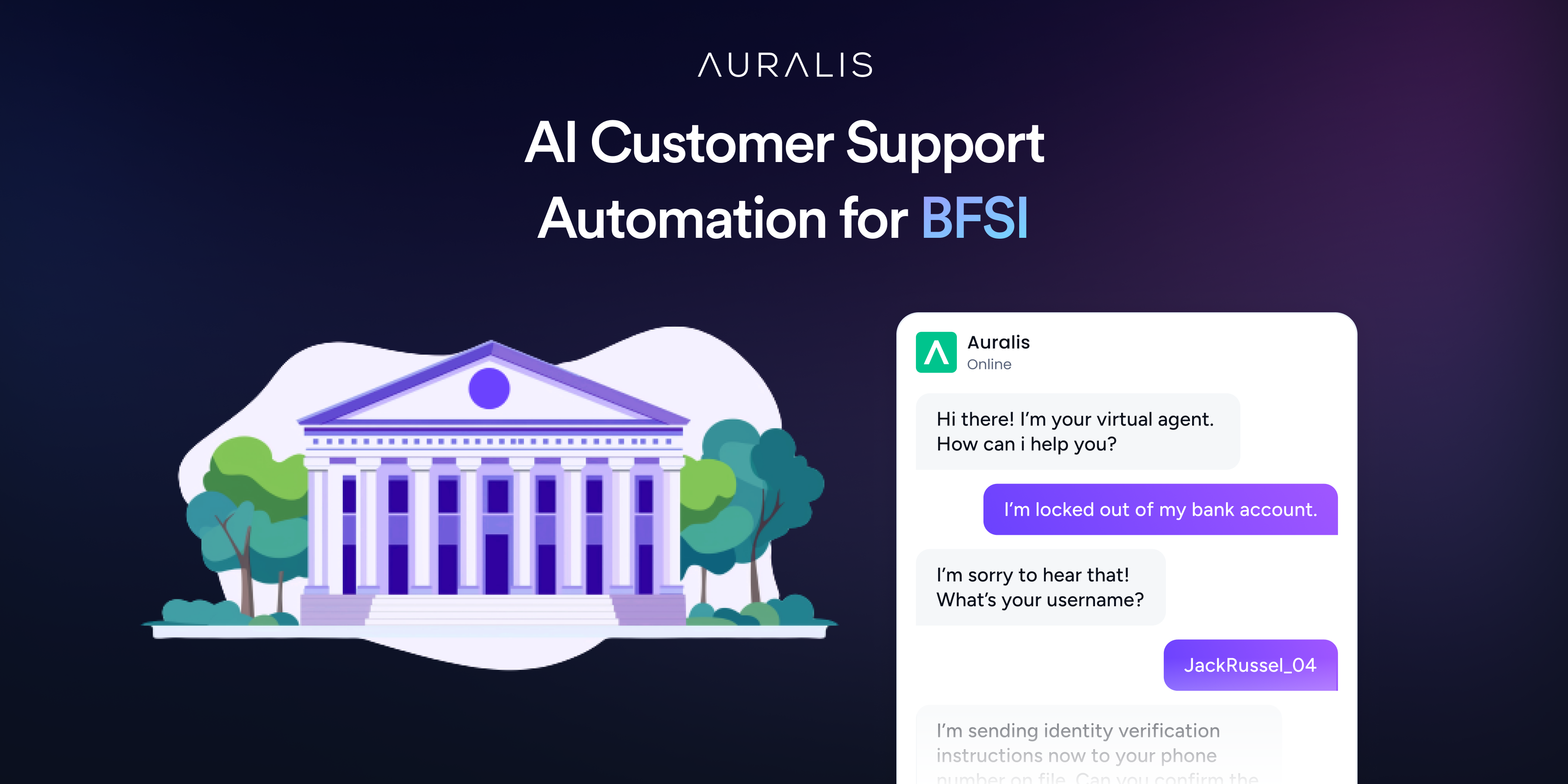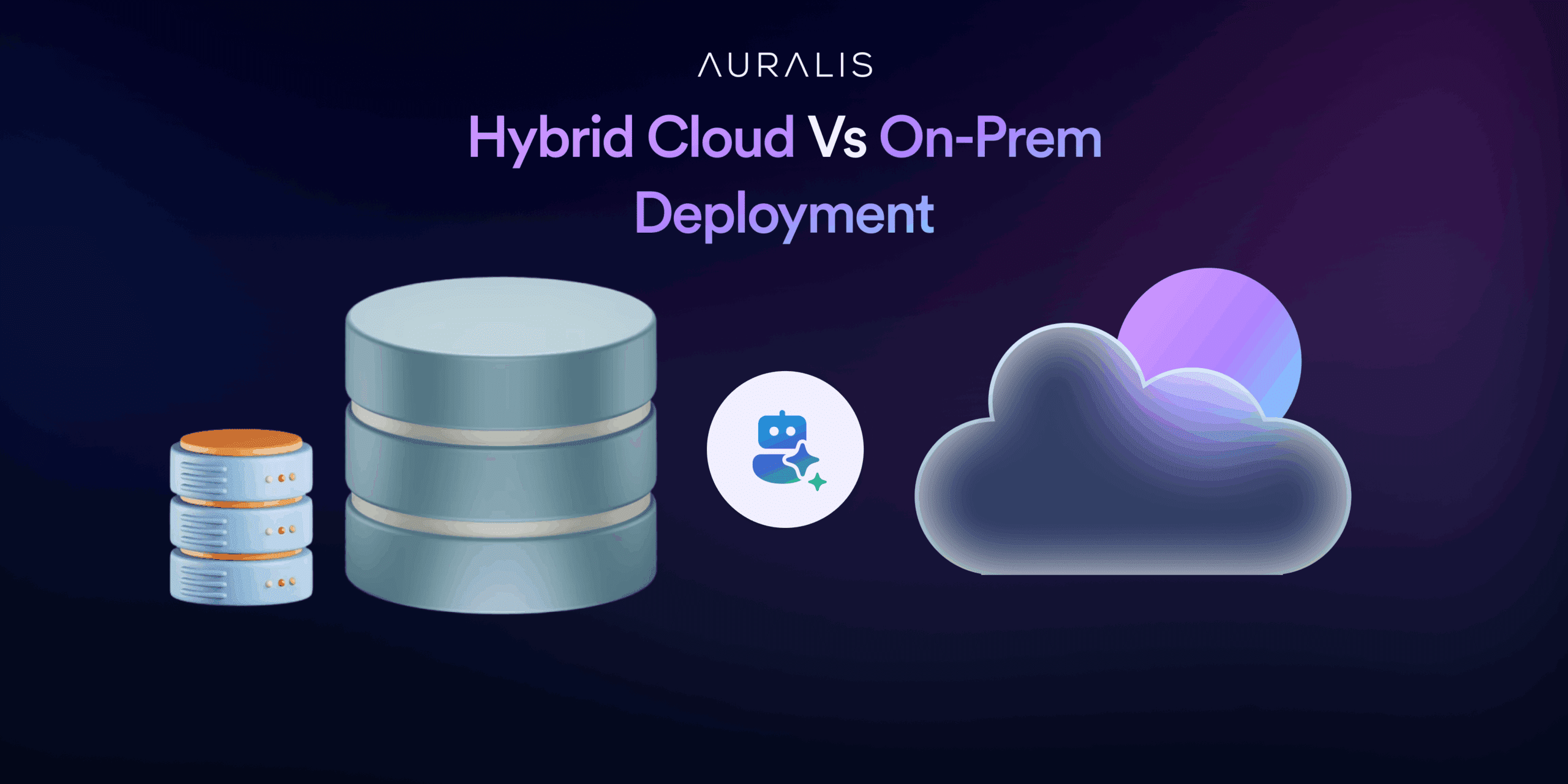It is common for customers to find the products and services typically offered by banks, insurance firms, and fintech companies as complex and hard to understand. This is why banking and finance companies see higher support queries on average. Dealing with all of them can be challenging, to say the least.
So here we will look at why and how AI-powered automation can be used for banking and finance customer support.
Table of Contents
Common BFSI customer support challenges
Here are some of the most common challenges that the banking, finance, and service industries face:
1. Handling high-volume routine queries
Banking, insurance firms, and fintech companies deal with a large influx of routine customer queries daily. Addressing all of them using human agents can often lead to operational inefficiencies and higher costs.
For example, a customer calling a bank during peak hours asking something as simple as “What is my account balance?” may experience delays, leading to frustration.
2. Ensuring security and compliance
The BFSI sector is governed by stringent regulatory measures, including data protection laws like GDPR, HIPAA, and PCI DSS. Ensuring secure interactions and safeguarding sensitive customer data during automated communications is critical.
For example, a customer discussing their credit card details via a chatbot can be at risk if the interaction isn’t secure, compliant, and encrypted.
3. Providing round-the-clock support
A report by Zendesk shows that 72% of customers in the digital banking sector prefer immediate service. This means being available to customers 24/7.
Emergency scenarios like initiating insurance claims after an accident or blocking a stolen debit card at midnight require immediate attention, as the lack of it might cause delays or severe financial loss for customers.
4. Resolving complex queries
BFSI companies often receive highly complex queries such as disputes over transactions, policy cancellations, investment portfolio adjustments, etc., which will demand deep domain knowledge.
For instance, a customer disputing a double-charged transaction might require a detailed investigation involving different systems, so there should be solutions in place that allow for seamless escalation to human agents.
5. Maintaining consistent support across channels
Modern customers are often present across diverse channels such as mobile apps, social media, etc. Customers also expect seamless and consistent support across various touchpoints. Maintaining consistent service quality and tone across these channels while ensuring a unified customer experience is crucial for financial institutions.
70% of customers believe that consistent experience across channels is important when choosing their primary bank.
Benefits of using AI customer support automation
Here are some of the benefits that make AI customer support automation well-suited for BFSI:
Faster responses
AI enables the fast, accurate, and precise handling of routine queries that regularly arise in BFSI customer support. This also reduces response times while eliminating errors, thus improving efficiency and customer satisfaction.
For instance, frequently asked questions regarding policy terms or loans or queries related to transaction histories or balance updates can be responded to in no time with AI automation.
Enhanced security and compliance
AI systems are designed with strict security and compliance standards in mind, which helps ensure customer data privacy and protection as well as adherence to regulations such as GDPR, PCI DSS, etc.
For example, AI-powered customer support platforms can redact sensitive information from chat logs, thus protecting customer privacy and reducing the risk of data breaches or regulatory fines.
24/7 availability
AI provides banks and other financial institutions a way to provide uninterrupted, consistent, round-the-clock support, without the constraints of business hours or holidays. This means that customers have access to reliable support during emergencies.
For example, if a customer needs to reset their net banking password at midnight, an AI-powered virtual assistant can help them, ensuring that their needs are met without having to wait for human agents.
Personalized assistance
According to Capco’s survey, 72% of customers hold personalization as “highly important” in the current financial services landscape.
AI can help deliver this demand by leveraging customer data to provide tailored solutions, recommendations, and timely updates. This not only enhances engagement but also builds trust which is critical in the BFSI sector.
Cost-effective scaling
As customer demand and queries increase, AI allows banks, fintech companies, and other financial institutions to manage and scale accordingly without proportional increases in operational costs. This is made possible by automating routine tasks and optimizing human resource allocation.
Reports suggest that chatbots are delivering $8 billion per annum in cost savings.
Must-have customer support automation for BFSI
These are some of the essential automation that can greatly enhance customer support for banks, insurance firms, and fintech companies:
1. AI chatbots
AI chatbots serve as the first line of interaction, providing quick and accurate responses to common inquiries. These chatbots can handle routine questions such as “What is my account balance?” or “When is my loan payment due?” with ease while ensuring that customer support is available 24/7.
For instance, a fintech company can use AI chatbots to address up to 70% of customer queries instantly, thus reducing wait times while freeing up human agents to handle more complex issues that require human intervention. AI chatbots can also assist customers through processes such as banking password resets, reporting lost/stolen cards, identity verification, fund transfers, etc.
2. Automated responses to queries
Automation tools can help streamline responses to frequent queries related to different topics like account activities, policy details, transaction statuses, etc. When customers request payment confirmation or policy premium schedules, automation can help provide the information in seconds without manual intervention.
For example, an insurance firm can automatically share confirmation messages when a policyholder renews their policy online. As efficiency and timeliness can make or break a customer’s experience with a banking or financial establishment, automation can ensure that this is achieved.
3. Proactive notifications and updates
Reminding customers of important deadlines such as credit card payments, policy renewals, or investment maturity dates is essential, and automated notifications let you do this proactively. For example, a bank can share email or SMS reminders to the user three days before a loan EMI is due, thereby reducing missed payments and late fees. Proactive communication of such kind improves financial responsibility and reduces customer churn.
4. Self-service portals for document uploads and FAQs
A study by Microsoft showed that a staggering 90% of customers across the globe expect businesses or organizations to provide a self-service customer support portal online.
Self-service portals can empower customers to resolve issues and complete tasks independently, thus providing them control and convenience, while significantly reducing the workload on customer support teams. From uploading documents for claims, and updating contact details to retrieving FAQs, an intuitive AI-powered self-service portal can contribute significantly to satisfactory customer experiences.
5. Multilingual support
Often, banks, insurance firms, and fintech companies operate across culturally and linguistically diverse regions. It is estimated that 70% of customers feel more loyal to companies that offer customer support in their native languages. Hence, automated multilingual support becomes crucial for effective communication with all customers. It is estimated that 70% of customers feel more loyal to companies that offer customer support in their native languages.
For example, if a bank is operating across India, they can use AI to offer customer support in major regional languages such as Bengali, Hindi, Tamil, etc. thus making for a more inclusive and accessible experience.
6. Fraud detection alerts
By monitoring transactions in real-time and instantly alerting customers about suspicious activities, automation can significantly enhance security and alleviate customer anxiety. If an unusual purchase is detected on a credit card, for instance, an automated system can instantly notify the cardholder and temporarily block the card, preventing unauthorized transactions.
7. Automated ticket routing
An automated ticketing system is another essential automation that can greatly improve the way customer support is handled by BFSI companies. When complex issues arise, this automation can help companies categorize them and assign them to appropriate departments or agents based on expertise.
For example, a query about disputed transactions can be directly routed to the fraud investigation team, resulting in faster resolution with minimal delays.
8. Compliance-driven record management and reporting
The banking and finance sector depends a lot on customer trust, so ensuring secure, compliant communication is of the utmost importance. Maintaining compliance with regulatory standards and laws is greatly simplified with AI automation. AI can automatically generate audit-ready reports and securely store transaction records, which can help when future conflicts arise.
9. Personalized product recommendations
86% of customers are willing to share their data to get a more personalized banking experience. You can deliver on this with AI-driven automation, as it can help provide highly personalized product recommendations by analyzing customer data. Banks can share recommendations for insurance policies, credit card offers, investment plans, and more, making support interactions an opportunity for upselling and cross-selling while improving customer satisfaction.
For example, a fintech app could analyze the user’s spending habits and recommend a cashback credit card or a savings account with higher interest rates. Similarly, insurance companies can recommend different policies based on a customer’s age, income, or family size.
10. Integration with CRM and core banking systems
Integration with CRM systems and core banking systems ensures that you have a unified view of customer interactions and histories, which can lead to more efficient and effective support. For example, when a customer reaches out regarding a loan inquiry, the agent can instantly access the customer’s account details, past interactions, and eligibility for offers, and thus provide a more tailored customer experience.
This seamless integration will also eliminate the need for customers to repeat themselves and ensure that they are provided with consistent and informed assistance, enhancing the overall support experience.
Conclusion
Considering the nature of their services and customer expectations, banking, financial services, and insurance companies are required to tailor customer journeys based on actual data. Thus, this eliminates standard automation as a viable option, as it lacks the adaptability and quickness demanded when building custom flows.
This is where an advanced and customizable AI support solution like Auralis can aid you. Auralis helps you bring timeliness, and reliability to your customer support by automating 70% of support queries and empowering your support team to be highly productive.Book a demo of Auralis today!



 9 min read
9 min read 







